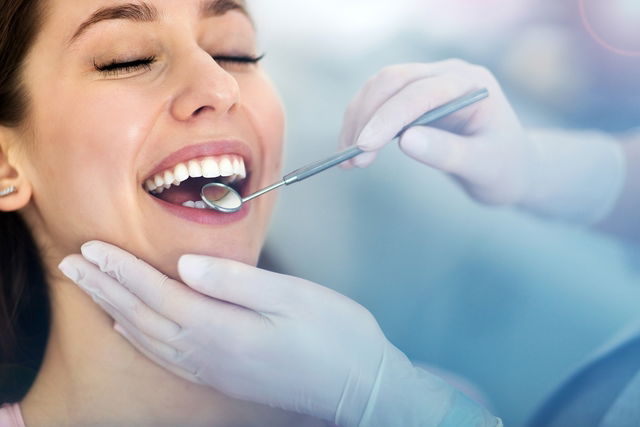Swollen gums, also referred to as gingivitis, usually occur due to the accumulation of bacterial plaque along the gum line. This can be caused by poor oral hygiene, uncontrolled diabetes, poor nutrition, a weakened immune system or the use of braces.
Swollen gums can be accompanied by other symptoms such as gum redness, sore gums and, in some cases, foul breath and bleeding when brushing.
The best treatment for swollen gums is to completely remove accumulated tartar by brushing your teeth correctly with a soft or electric toothbrush and flossing daily. However, you should see a dentist for assessment and a cleaning. The dentist may prescribe medication to relieve pain and inflammation if necessary.

Main causes
Swollen gums can be caused by:
1. Poor oral hygiene
Poor oral hygiene can cause swollen gums due to the growth of bacteria that is naturally found in the mouth. This growth and spread can occur when food accumulates in between the teeth and if oral hygiene is not consistent.
Bacteria that grow and spread in the mouth can start to attach to the teeth, giving rise to bacterial plaque and inflammation in the gums.
What to do: You should brush your teeth with a soft or electric toothbrush at least twice a day, and floss at least once a day to remove food that accumulates between the teeth. You can also use a mouthwash solution that can be prepared by mixing 10 mL of 10 volume hydrogen peroxide or chlorhexidine with ¼ cup of water. You can gargle this solution once a day, preferably before bed.
2. Smoking habits
Smoking causes swollen gums due to the nicotine present in cigarettes. This substance can reduce blood flow in the gums and also promote tartar accumulation in the teeth, leading to swollen gums.
Furthermore, the nicotine in cigarettes also reduces oxygen levels in the blood, making it more difficult for swollen gums to heal.
What to do: You should see your dentist regularly to have your teeth cleaned to remove tartar. In addition, you should stop smoking to avoid worsening gum inflammation, which can lead to damage to bone and tissue damage.
3. Uncontrolled diabetes
Diabetes is a disease that causes changes in blood vessels. They can become thicker, reducing the amount of nutrients that reach the gums. This can make it difficult to remove waste produced by cells in the mouth, causing weakening of the gums and teeth and increasing the risk for infections.
Additionally, when diabetes is not controlled, high blood sugar levels lead to the growth of bacteria that can cause swelling of the gums.
What to do: You should maintain adequate oral hygiene, brushing your teeth at least twice a day, using dental floss and using mouthwashes as recommended by your dentist. In addition, you should follow up with an endocrinologist to manage your diabetes and prevent the risk for developing swollen gums.
Also recommended: Diabetes Medications: Insulin, Oral Meds & Natural Options tuasaude.com/en/diabetes-medications4. Pregnancy
Pregnancy can cause expected hormonal changes and the increase blood volume in the body,. This can lead to some women to experience gum sensitivity and swelling, as well as bleeding when brushing.
What to do: You should use a soft toothbrush and continue brushing your teeth and flossing regularly. Furthermore, you are also advised to consult your dentist for assessment if symptoms are moderate to intense.
5. Use of braces
Using braces can make it difficult to clean your teeth, which can promote the accumulation of food between the teeth. This can lead to plaque and tartar, causing gum swelling.
What to do: You should maintain optimal oral hygiene habits if you wear braces. In addition to flossing, you should also use an interdental brush, which are specially made to access hard-to-reach areas in the mouth.
6. Use of dentures
The use of poorly placed or inadequately cleaned dentures can result in the accumulation of food and the formation of plaque, which can cause swollen gums.
What to do: It is important to maintain adequate oral hygiene, and to brush your teeth and floss at least twice a day. Furthermore, if the dentures are removable, it is important to removed them at night so that the mouth and prosthesis can be cleaned as instructed by the dentist.
7. Poor nutrition
Poor nutrition and a deficiency of vitamins A, B, C, D, E and K, coenzyme Q10 or minerals like calcium, magnesium, iron, zinc, potassium, copper manganese and selenium, can lead to gum damage. These deficiencies can promote bacterial growth in the mouth and also reduce immune responses against these bacteria, causing gum swelling and infections.
What to do: You should opt for a balanced diet with fresh fruits and vegetables, protein like fish or chicken, and whole grains, as they contain the nutrients that are essential for gum health. Furthermore, you are advised to consult a registered dietitian who can guide you in formulating a diet and meal plan that meets your health goals and addresses any nutrient deficiencies.
8. Weakened immune system
Some health conditions, like leukemia, HIV or cancer treatments, can weaken the immune system and reduce the body's defense capacities against microorganisms. This can lead to gum infections, bleeding and inflammation.
What to do: Optimal oral and tooth hygiene should be maintained to prevent the accumulation of bacterial plaque that can cause infection and inflammation in the gums. You are advised to brush your teeth at least 3 times a day, to floss daily and to see your dentist regularly.
9. Use of medications
Some medications such as phenytoin, haloperidol, corticosteroids, propranolol, and olanzapine, or antidepressants such as fluoxetine, paroxetine, amitriptyline and nortriptyline, for example, can interfere with saliva production. They can leave the mouth drier, which increases the risk for gum diseases, gum swelling and cavities.
What to do: You should inform your doctor of any side effects your medications are causing, like swollen gums, and consult your dentist regularly to assess the health of your gums and teeth. If necessary, the doctor may prescribe artificial saliva.
Home remedies for swollen gums
Some home remedies such as hydrogen peroxide solution, licorice tea or turmeric paste are great options to complement treatment for swollen gums. They can be gargled as a mouthwash or applied to the teeth after brushing, as they have anti-inflammatory, analgesic, antiseptic and antibacterial action that can help to relieve symptoms.
To maintain optimal oral health and prevent swollen gums, you should brush your teeth daily with a soft brush and toothpaste. Be sure to use dental floss and mouthwash to eliminate the food debris that can accumulate between teeth and cause gum inflammation, cavities or infections.
